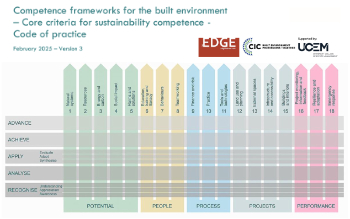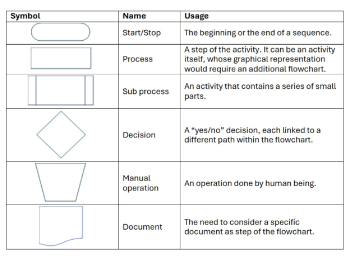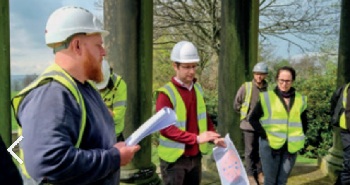The Impact of Construction Companies on Local Economies
[edit] Creating jobs and career prospects
The local economy cannot create jobs without manufacturing enterprises. Engineers, architects, project managers, and other specialists are examples of cooperating professionals. Regardless of how big or small, construction projects consistently offer locals new jobs. Families gain from this since unemployment rates are lower and regular revenue is provided.
Furthermore, the impact of career development in the construction industry extends beyond the specific industry. Local contractors and suppliers benefit from increased demand for building materials and machinery. Employment prospects are boosted by this increase in employment activity in productive sectors such as manufacturing, transportation and retail
A workforce that is capable and flexible is also produced by the knowledge and skills that employees in the construction sector acquire. Building projects provide training opportunities and courses that give workers employability and career chances by providing them with real-world skills that they may utilise in a range of industries. Consequently, this enhances the community's overall economic structure.
[edit] Urbanisation and Infrastructure Development
Building is essential for providing the infrastructure required for urbanisation and economic growth. Buildings for schools, hospitals, businesses, and bridges are all constructed by the construction sector. These structures not only offer the community essential services but also draw investors and entrepreneurs, promoting additional economic expansion.
The existence of contemporary infrastructure raises the standard of living for locals. Better transport facilitates the efficient movement of people and goods by reducing costs and travel time. Access to high-quality health and education facilities produces healthy and well-educated people, which are essential for long-term economic success, and offices and commercial buildings provide spaces for creativity and businesses that support local economies a it is developing.
Towns and cities expand as a result of urbanisation, which is fuelled by construction activity. The demand for housing and amenities rises as more people move to cities in quest of better possibilities. By constructing public infrastructure and residential complexes, construction businesses play a critical role in satisfying this demand. Urban growth spurs additional investment, resulting in a constructive feedback loop for economic growth.
[edit] Economic Multiplier Effect
Local economies benefit greatly from the building industry's economic multiplier impact. An economic chain reaction is triggered when a construction project is started. There is a growing need for the goods and services offered by nearby enterprises that supply raw materials, rent out equipment, and offer services. Higher revenues and the development of new jobs follow from this.
The local economy benefits from the earnings paid to construction workers and other project staff. Several industries, particularly retail, hospitality, and recreation, gain from this expense. For instance, construction workers can spend money at nearby retailers, dine at local eateries, and support regional businesses. This rise in consumer spending helps small firms and promotes economic growth because they are frequently the backbone of local economies.
Furthermore, local administrations' finances are strengthened by the taxes collected from building projects. The money raised can be put back into community development initiatives including parks, leisure centres, and public services. Beyond the short-term project, construction businesses have a significant beneficial overall economic impact that lingers in the community.
[edit] Property values and the real estate market
The activities of construction companies significantly impact the local property values and the real estate market. To satisfy the rising demand from both citizens and businesses, more residential and commercial properties are being created. As real estate prices rise, more individuals and companies must be able to afford residential and commercial real estate.
Furthermore, the development of first-rate structures and infrastructure raises an area's allure overall. Property values rise in well-established districts with contemporary facilities because they draw in prospective purchasers and investors. Homeowners gain from the growth in property values since their investments become more valuable. Furthermore, it draws in more investments, which sustains the region's economic expansion.
Construction companies are also involved in urban transformation and renewal initiatives. Through the restoration and adaptive reuse of old or abandoned buildings, they bring life to run-down areas. This new vitality is drawing businesses and inhabitants to the neighbourhood and improving its aesthetic appeal, which is promoting local economic growth.
[edit] Community Development and Social Impact
In addition to their economic contributions, housing projects have a significant impact on social development and community development. They are frequently involved in Corporate Social Responsibility (CSR) activities, including sponsoring charities, funding educational projects, sponsoring community events These initiatives strengthen community social order and creates a sense of community.
Parks, sports arenas, and community centres are examples of public areas and leisure facilities built by the construction sector. These areas improve the community's quality of life by offering places for rest, exercise, and socialisation. Cohesive and successful neighbourhoods attract both individuals and families due to their abundance of municipal amenities.
Furthermore, housing societies have a stake in promoting sustainable development practices. By using eco-friendly building practices and using sustainable materials, they reduce the carbon impact of their projects and promote environmental protection encourage Besides being good for the environment, sustainable building techniques improve the living and working conditions of local communities, promoting long-term social and economic well-being.
[edit] Conclusion
In summary, construction industries have a variety of impacts on local economies, causing devastating effects on job creation, employment, economic expansion, and the well-being of local residents that drive up real estate prices, help industries, and encourages urbanisation. Additionally, the overall level of living in the communities they serve is raised by their dedication to sustainable methods and corporate social responsibility. Local economies need manufacturing enterprises to grow and prosper in the long run.
[edit] FAQs
[edit] 1. How do construction companies contribute to job creation?
A wide spectrum of specialists, including engineers, architects, workers, and project managers, can find work with construction companies. Numerous jobs are created by each project, lowering unemployment rates and giving local people steady incomes.
[edit] 2. What is the economic multiplier effect of construction companies?
The cascade of economic activity that building projects initiate is known as the "economic multiplier effect." Higher revenues and the development of jobs in associated businesses are the results of increased demand for goods and services. Earned wages are used locally, promoting consumer purchasing and aiding small enterprises.
[edit] 3. How do construction companies impact property values?
Building firms expand the availability of real estate, facilitating easier access to residential and commercial areas. An area's attraction is increased by well-built structures and infrastructure, which raises property values and draws in new investment, which benefits locals and homeowners alike.
[edit] 4. What part do building firms play in the betterment of communities?
Building businesses sponsor philanthropic groups, fund public facilities, and participate in corporate social responsibility programs. They improve people's quality of life and sense of community by supporting sustainable practices and public space development.
[edit] 5. What aspects of sustainable development do construction companies contribute to?
Building businesses use environmentally friendly products and green construction techniques to lessen the environmental impact of their operations. Sustainable methods benefit the environment, communities, and living and working situations.
[edit] Related articles on Designing Buildings
- Assessment.
- Business justification case.
- Business case.
- Business plan.
- Development appraisal.
- Economy.
- Effectiveness.
- Evaluation.
- Full business case.
- Green book.
- Outline business case.
- Political economy.
- Procurement.
- Public procurement.
[edit] External Links
Featured articles and news
ECA digital series unveils road to net-zero.
Retrofit and Decarbonisation framework N9 launched
Aligned with LHCPG social value strategy and the Gold Standard.
Competence framework for sustainability
In the built environment launched by CIC and the Edge.
Institute of Roofing members welcomed into CIOB
IoR members transition to CIOB membership based on individual expertise and qualifications.
Join the Building Safety Linkedin group to stay up-to-date and join the debate.
Government responds to the final Grenfell Inquiry report
A with a brief summary with reactions to their response.
A brief description and background to this new February law.
Everything you need to know about building conservation and the historic environment.
NFCC publishes Industry White Paper on Remediation
Calling for a coordinated approach and cross-departmental Construction Skills Strategy to manage workforce development.
'who blames whom and for what, and there are three reasons for doing that: legal , cultural and moral"
How the Home Energy Model will be different from SAP
Comparing different building energy models.
Mapping approaches for standardisation.
UK Construction contract spending up at the start of 2025
New construction orders increase by 69 percent on December.
Preparing for the future: how specifiers can lead the way
As the construction industry prepares for the updated home and building efficiency standards.
Embodied Carbon in the Built Environment
A practical guide for built environment professionals.
Updating the minimum energy efficiency standards
Background and key points to the current consultation.
Heritage building skills and live-site training.























